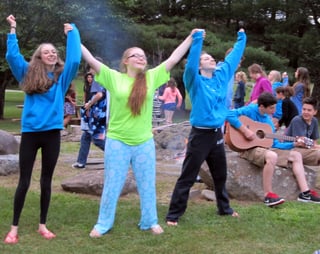Editor's note: This week, we feature guest blogger Candy Cohn, Assistant Director of Maine Arts Camp, an overnight camp for 9-16 year old boys and girls in a non-competitive, nurturing environment. Located on Unity College’s campus, the program focuses on visual & performing arts, technology and individual/lifetime sports. Please read Candy's full bio below.
Every summer we see amazing transformations at camp. Children and teens who struggle during the year tell us they are so happy to finally find a place where they feel at home.
This past summer we had a returning camper who had struggled with us the previous summer. I’ll call her Sally for my story. We made great progress with her this past summer, and I’d like to share some of the techniques that proved successful. I’d say a key part of our success was due to our teamwork in partnering with parents and staff. First of all, we worked closely with Sally’s mother and therapist to prepare for the summer. Her mother communicated well with us prior to camp, both by email and on the phone. I also requested to talk to Sally’s therapist, which her mother happily agreed to.
During staff training we prepared our counselors and instructors by giving them Sally’s history and the recommendations from her mother and therapist. This included:
- Encouraging her to keep a journal with her at all times since writing or drawing often calms her down and helps her to focus.
- Giving her a job or responsibility in the dorm and in activities. This can help head off attention-seeking behavior and increase her self-confidence.
- Give her positive feedback when she makes even a little progress in an activity or with social encounters.
We continued to communicate with our staff about Sally throughout camp so we could work together in a consistent manner. Whenever one of us made progress with her, we would inform the whole staff to share what techniques were beneficial.
The first summer Sally was with us at Maine Arts Camp she came for two weeks. She cried much of the first week saying she was homesick and wanted to leave. At first our counselors spent excessive amounts of time trying to get her to feel better. Finally we all realized we needed to redirect her, get her involved in her activities and engaged with other campers.
When I heard Sally was returning for four weeks, I had a mixed reaction. I was pleased that she wanted to come back for a longer stay at camp after getting off to a shaky start the first summer, but at the same time I was concerned that she would prove to be so challenging our staff would expend too much time and energy on her, taking away from other campers. Sally’s mother had told us Sally loved camp once she got past her terrible homesickness and couldn’t wait to return.
Her mother sent us a long personal history form that included more details than what she had shared with us the first summer. She explained that Sally attaches strongly to people, calling everyone her best friend. She often doesn’t know when to stop, which can scare kids away. We decided we’d say to Sally, “We’re going to try to help you make friends, and we’ll give you tools to use. If we see you forgetting to do these things, we’ll have a signal to remind you without embarrassing you.”
Her mom said we might need to remind Sally to take care of personal hygiene activities and to clean her room. After discussing her interpersonal and self-care challenges, we decided give Sally a private dorm room rather than assigning her a roommate as we typically do. This way she wouldn’t disrupt another camper’s experience even if she was struggling. Sally’s mother agreed that this was a good idea.
On top of all of this, Sally’s mother told us that Sally had to practice about 15 minutes a day for her upcoming Bat Mitzvah and asked if anyone at camp could oversee her doing this on a regular basis. I decided that I would step forward to do this, which would give me an opportunity to form a bond with Sally.
The first time I met with Sally to help her, I was amazed at how well she did. Of course, I praised her effort enthusiastically, and she responded in a positive way. I asked if she was excited for her Bat Mitzvah, and Sally responded, "I'm so nervous because I get stage fright!" I immediately countered with, "Yeah, it can be scary, but you'll do great! You have such a pretty voice! I didn't even know that until today." Then I asked her if she has a big party planned. She said she did, so I asked her if she has a theme for her party. She smiled and said it's Matilda. I said, "Oh, I love Matilda!" She then told me she also loves Matilda and has seen the Broadway show a couple times. It was a wonderful, upbeat conversation.
Afterwards I said to Sally, "When you're feeling sad, it might be helpful if you could think happy thoughts, like what it felt like when you went to see the show Matilda." I told her to try to picture it in her mind, using all her senses. I prompted her to remember what it felt like, what she saw, how it sounded, and even the smells of the theater. I then asked her if she had any other place she remembers being happy. She described sitting on the porch swing at home with her brother. I invited her to picture that wonderful feeling of swinging.
Later, I shared with the staff what transpired. I revealed that Sally responds well to guided-imagery as a way to redirect her negative thoughts. I also suggested they use what I discovered as conversation starters with her: Broadway shows, her Bat Mitzvah, and the fact that I said she had a beautiful voice. I could see Sally’s whole demeanor change from that day on. She had been a bit of a loner till then, but from that day forward I constantly saw her with friends.
I also had a chance to see Sally’s artwork when I came to help her with her practice. I could see she was making great progress, especially in her needle felting class. I made sure her instructor was giving her ample positive feedback, and in the end the instructor asked Sally to be one of the campers demonstrating how to do needle felting on parent visitation day. When her mother came to pick her up from camp she was thrilled by her daughter’s transformation.
A couple weeks after camp we received the following note from Sally’s mother:
"Maine Arts Camp exceeded my expectations this year. Sally turned around so much this summer. Being with other children who share her interests helped her relax, be herself, and grow. The experience helped her develop good relationships with the people around her. It allowed her to grow creatively in ways she didn't know she could. The personal care and interest in Sally meant so much to us—knowing that she was really being treated as an individual and being allowed to be her quirky self while being guided in her interpersonal relationships. Thank you so very much!"
Like Maine Arts Camp staff, Executive Function coaches also believe that partnering with parents is key to effective support for students who are struggling in school. Contact us to learn more about Executive Function coaching.
 Candy attended the Neighborhood Playhouse School of Theater in New York City, where she studied acting, speech, modern dance and jazz. After pursuing an acting career for several years, Candy attended Penn State and Rutgers Universities and earned a Bachelor of Arts with a major in Communication and a minor in Art. Candy served as a coordinator of an elementary school arts education program designed to introduce children to famous works of art. As Maine Arts Camp Assistant Director, Candy wears many hats during the summer, including training and managing a staff of over 40 people. Throughout the rest of the year, she resides in Florida and helps to recruit campers and staff, does marketing, communicates with camper families, and works with Camp Director Rick Mades to continuously explore ideas to bring Maine Arts Camp to new heights. Contact Candy at maineartscampsummer@gmail.com.
Candy attended the Neighborhood Playhouse School of Theater in New York City, where she studied acting, speech, modern dance and jazz. After pursuing an acting career for several years, Candy attended Penn State and Rutgers Universities and earned a Bachelor of Arts with a major in Communication and a minor in Art. Candy served as a coordinator of an elementary school arts education program designed to introduce children to famous works of art. As Maine Arts Camp Assistant Director, Candy wears many hats during the summer, including training and managing a staff of over 40 people. Throughout the rest of the year, she resides in Florida and helps to recruit campers and staff, does marketing, communicates with camper families, and works with Camp Director Rick Mades to continuously explore ideas to bring Maine Arts Camp to new heights. Contact Candy at maineartscampsummer@gmail.com.

